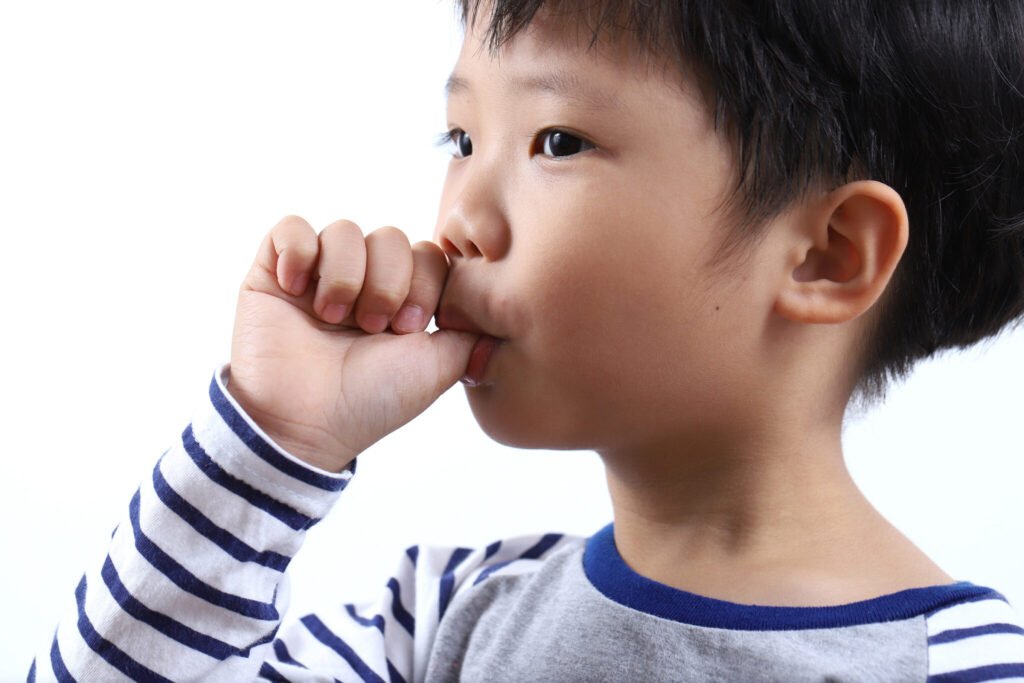Thumb Sucking
At Dr. Harman Raheja Dentistry, we recognize that thumb-sucking and finger-sucking play a comforting role for children. These behaviors frequently begin at a young age, with certain habits even originating during prenatal development. It’s worth noting that around 75% to 95% of infants partake in thumb-sucking, suggesting a potential familial history of the behavior. However, extended and intense thumb-sucking or finger-sucking can lead to notable impacts on your child’s health, emphasizing the importance of remaining attentive to potential signs.

What Signs Should I Watch For?
At Dr. Harman Raheja Dentistry, we recognize that sucking is an inherent instinct in infants, playing a crucial role in providing a sense of comfort and satisfaction. This soothing reflex can even promote relaxation, often observed as children fall asleep while engaging in finger-sucking. As emphasized by the Dental Association, most children naturally abandon this practice between the ages of 2 and 4 as its significance diminishes with growth. Nevertheless, a few children persist beyond their early years. Should your child continue finger-sucking once their permanent teeth start emerging, it would be wise to contemplate strategies aimed at helping them overcome this habit.
What Are The Consequences Of Thumb Sucking
At Dr. Harman Raheja Dentistry, we stress that passive sucking, such as the gentle presence of a thumb or finger inside the mouth, is improbable to cause issues with oral well-being. Conversely, forceful sucking, characterized by exerting pressure on the mouth or teeth, holds the capacity to result in challenges concerning tooth arrangement and the formation of the oral cavity. Extended durations of sucking can influence both dental hygiene and facial structure, giving way to matters such as improper bites, irregular teeth, or misalignments of both the teeth and the jaw.
How Can I Help My Child Quit Thumb Sucking?
At Dr. Harman Raheja Dentistry, we adopt a supportive and positive stance when dealing with your child’s finger-sucking tendencies. Instead of resorting to punitive measures for aggressive sucking, it proves more effective to offer praise for refraining from the habit. Implementing disciplinary actions could potentially result in resentment and undermine the trust they have in your guidance. It is essential to openly discuss the potential repercussions of continuous sucking on their teeth and actively encourage and support their endeavors to break the habit.
If you notice your child turning to finger-sucking as a response to anxiety, it becomes important to assist them in managing their anxiety levels. Recognize that finger-sucking acts as a symptom of a broader underlying issue, making it necessary to prioritize addressing the root cause to prevent escalation into more severe symptoms. As a helpful tactic, you may consider applying a band-aid to their thumb or fingers or using a sock to cover their hand during nighttime. This approach is not meant as a punishment, but rather as a reminder to avoid the behavior. Another approach involves identifying specific times when your child tends to suck their thumb and introducing distractions during those periods. Always exercise your best judgment in handling these situations.
If you suspect that your child’s finger-sucking habit is having a negative impact on their oral health, we encourage you to contact us at Dr. Harman Raheja Dentistry. Our dedicated team is available to offer guidance and professional support, ensuring your child’s oral health remains in optimal condition.